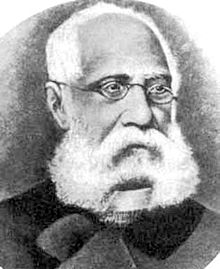Ferdinando Petruccelli della Gattina
| Ferdinando Petruccelli della Gattina | |
|---|---|
 |
|
| Born |
August 25, 1815 Moliterno, Kingdom of Naples |
| Died | March 29, 1890 (aged 74) Paris, France |
| Occupation | Journalist, Novelist, Politician |
| Nationality | Italian |
| Alma mater | University of Naples, Sorbonne, Collège de France |
Ferdinando Petruccelli della Gattina (August 28, 1815 - March 29, 1890) was an Italian journalist, patriot and politician.
Considered one of the greatest journalists of the 19th century and a pioneer of modern journalism, he is mostly remembered for his war correspondence. He wrote for many Italian papers and contributed to the press in France, Great Britain and Belgium. He was also a prolific novelist, mainly focused on religious themes.
Born at Moliterno, Basilicata, at the time part of the Kingdom of Naples, his birth name was Ferdinando Petruccelli and he added "della Gattina" (name of a farm of his own) to his surname in order to avoid the Bourbon police who persecuted him for political reason. His father Luigi was a physician and member of the Carbonari while his mother Maria Antonia Piccininni was a noblewoman from Marsicovetere.
Grown up in religious circles and because of the abuses received as a child, he developed a strong anticlericalism which will be reflected in his works. During his young age, he devoted himself to the study of Latin and Greek. Later, he attended the University of Naples, graduating in medicine but he chose the path of journalism.
In 1838, he began his career for the Neapolitan newspaper Omnibus and, in 1840, he traveled to France, Great Britain and Germany as a correspondent for Salvator Rosa and Raccoglitore fiorentino. Because of his liberal ideas, he was arrested for his membership in Young Italy and was sent under guard to his native town.
Returned to Naples in 1848, Petruccelli was elected deputy of the Neapolitan parliament and founded Mondo vecchio e mondo nuovo, a newspaper who accused the Bourbon dynasty of misgovernment in both internal and foreign policy and, for the frequent attacks on the crown, it was suppressed by the magistracy. After the suspension of the constitution promulgated by the king Ferdinand II few months before, he took part in the riots of the same year. The revolt failed and he was forced to escape to France, while the government sentenced him to death and confiscated his properties.
...
Wikipedia
